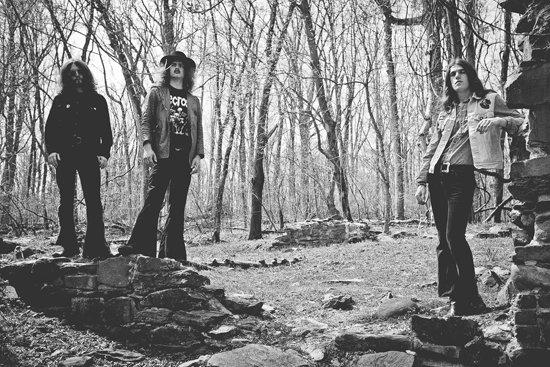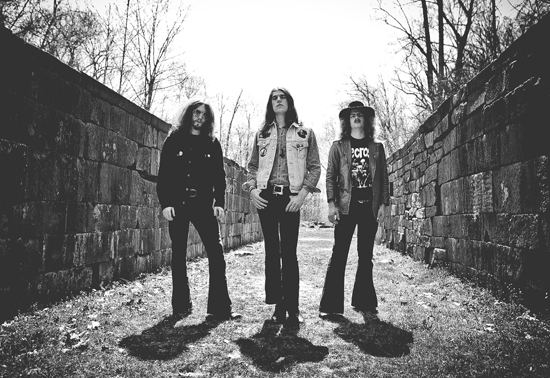Satan’s Satyrs play some of the most visceral and demented rock & roll around – full-frontal lo-fi lunacy. Not long out of their teens, the Virginia trio were initially inspired equally by the pummel-drive of Black Flag, the chest-crushing vortex of vintage Electric Wizard, the primitive bruising of Witchfinder General and the loose hell of Pentagram, alongside all manner of cranky old VHS horror movies. But while 2011 debut album Wild Beyond Belief was exactly that – an into-the-red garage piledriver of a record – new album Die Screaming is a far more complex affair, bringing NWOBHM melodic sensibilities and raw, late-1960s acid tinged boogie jams into the equation.
Now a fully functioning power trio, Satan’s Satyrs was initially the brainchild and solo project of vocalist/bassist Clayton Burgess – albeit one that featured a small cast of collaborators, one of whom was known simply as ‘The Ghoul’. In 2011, a then eighteen year-old Burgess wrote, recorded and mastered Wild Beyond Belief singlehandedly. One of the most caustic debuts of recent memory, it was recorded "in the red, all of it" (more on that later) and saw the inexperienced Burgess mixing down on a set of cheap headphones, late at night. The resulting racket was revelatory blackened punk and doom (indeed, pretty much the only point of contemporary comparison for that record is obscure Pennsylvania hoodlums Midnight).
Invited by Electric Wizard to play the Jus Oborn curated ‘Electric Acid Orgy’ at Roadburn 2013, the band also completed a set made up entirely of covers of 1960s proto-metallers Blue Cheer over that weekend. These appearances, alongside the European release of Wild Beyond Belief last year via Bad Omen Records – went some way toward solidifying the band’s growing underground reputation.
The enthusiastic patronage of Electric Wizard also helped matters, of course. Wizard founder Jus Oborn had this to say in the Roadburn programme: ”they push the filthy line between 60s punk and doom… Sabbath, Venom, Stooges, Flag. Violent, filthy, ugly and loud, like it should be. Fuckin genius! And they truly understand the spiritual importance of exploitation movies and horror culture (not just ripping it off)… from 50s comics to biker/horror hybrids… they know…the chosen few…."
Indeed, the Wiz’ were so impressed that Burgess is now also playing bass in the band. The Quietus caught up with Clayton Burgess on the phone from "the Wizard house" in deepest Somerset, where he was rehearsing for a slew of headline festival gigs over the summer.
So could you tell us a little bit about the start of Satan’s Satyrs?
Clayton Burgess: The band really started in the summer of 2009 – that was when the first song was recorded, I think. Back then it was really just two guys – myself and a guy called ‘The Ghoul’ – and we were still just in high school, about 15-16 years old, on summer vacation recording songs. We did a demo tape – Wizard and Black Flag were the primary influence for us. It was just what we’d do on Friday night, Saturday night; we’d get together and put those records on, Black Flag, Pentagram, Witchfinder General. And it was cool because a lot of the time these bands were new to us, the discovery of them was still fresh. It was two teenagers buzzing off the excitement of the music. We just had to express our love for it really.
You come from Herndon, Virginia. Did you meet many kindred musical spirits there?
CB: Where we come from, nobody else liked this stuff. We had a couple of friends here and there – we’d hang out and watch a movie or go hang out in the graveyard, but we were peripheral freaks… It was a really small group. We never made an attempt to break into the local music scene. I grew up on black metal, that’s what I got into when I was quite young, thirteen or so. So I always knew that you could get away with just putting out demo tapes, put together a really killer tape and just spread it around and fuck the local scene, you know? But it was never an issue, we just knew that we were making this music for ourselves, and to find other people that were into it we’d have to send it around the world.
Tell me about the recording of Wild Beyond Belief. It’s one of the most full on slabs of rock & roll I have ever heard; you played everything, correct?
CB: [Laughs] Thanks, man. Yeah, I recorded the album summer 2011 and I recorded all the instruments. It took a while, a number of months. I guess I was the only one capable of doing it – if you need something done right, do it yourself, you know? I just thought ‘fuck it, just let me go in and make the record I’ve been dreaming to hear’ and that was the case with that record. It’s like a one note record – it exhausts a theme – like total wall of noise, total speed and ferocity. I needed to get that out of my system. It was like, ‘I’ve been saying I’m into Black Flag, I’ve been saying I’m into Electric Wizard, lets do something with it’. I did guitar, bass, drums, vocals, everything. I’d run over to the desk, hit record and then run over to the drums, and then I mixed the whole thing too. So I am responsible for the mix, whether you like it or not. [laughs]
It’s a totally messed up sounding record – incredibly distorted and muddy…
CB: The thing is, I didn’t know anything at all about mixing a record – nothing. The way I recorded it was absolutely everything in the red that, clumsy as it sounds, is actually a pretty good way of recording a record [laughs]. Certainly a lot better than recording nothing in the red, that’s for sure. I thought, well, if it’s in the red then… well, uh, that’s just normal to me. Drums, vocals, everything in the red. But when I came to mix it, I mixed the whole thing in headphones. I was quite young and unaware of how to mix properly, so I mixed it all in the cans. The funny thing is, everybody says it has this totally blown out, totally bushy sound, but I really didn’t know how extreme it would sound until I got the test pressing – so I was as shocked as anyone else really. It’s an honest record, it totally reflects my skills as an ‘engineer’, producer, whatever. It’s an idiosyncratic record – it’s not really ‘right’ at all – but I’d prefer a unique record to a ‘right’ record. It’s a circumstantial sound.

A lot of people will be coming to the new record – Die Screaming after only recently discovering Wild beyond Belief. Do you think people may be shocked by how far the sound has developed?
CB: Wild was done mid 2011. It took a year to come out and it came out in 2012 on a couple of different labels… Bad Omen put it out in Europe in 2013, so it took a while to disseminate, and it’s kind of still going. People are still discovering it like it came out yesterday, so I can imagine their shock when they discover ‘Die Screaming’. But people have to understand that there is more than two years’ difference with the record.
Personally speaking, my record collection grew immensely in that period of time, and influences develop, you hear new things. My skills as a songwriter and musician developed. And in addition to that, we put together a full band for the first time in the group’s history – before that, it was more of a project. I might have recorded something on my own and done a gig or two with a friend filling in, but we put together a band in 2012 before recording Die Screaming – a full power trio, which is totally conducive to this sort of music. I never wanted this to be a novelty act. I wanted a real band that could play real rock & roll. The line up had already been together for about a year by the time we did Roadburn last year. After that, we just threw ourselves into writing this record. We had the chance to give these songs a little breathing room before we committed them to tape.
Have you road-tested the record?
CB: A couple of weeks ago we did a small tour in the US. We didn’t go very far, just did something small to get ourselves reacquainted with playing live because we hadn’t done so for so long. We’re ready to dive into the new stuff – hopefully people will dig it.
You are also playing bass in Electric Wizard. Is this a permanent arrangement?
CB: Well, as far as I know I’m the only bass player here [laughs]. Obviously, there has been talk with the forthcoming Wizard record, but I came in after the fact, auditioned right after they’d finished recording, and it’s already generating a buzz. But I didn’t participate in that record. We’ve done a festival in Norway and then we have a slew of other dates across the summer. I’m in it to put on a good show with those guys and jam out, you know? I’ve been spending a lot of time down here jamming and getting acquainted with England.
Is there any culture shock for you in the West Country? I love it down there. Are you a cider drinker?
CB: [Laughs] No, but I hear that’s some good shit. I really enjoy being over here. Certainly being out here in the countryside is fantastic for me, it just affects me, it’s a great place to be, you get in the mood, it’s killer down here; the movie marathons at the Wizard house…
Vintage horror and biker movies are a vital part of both Electric Wizard’s and Satan’s Satyrs’ spiritual make up. Can you tell us a little about this?
CB: The music is a reaction to the way the movies make us feel, I guess – it’s not like we’re giving a synopsis of a movie in a song, though. I guess it’s a different mentality. We don’t want everything explained or laid out in black and white, we want a little ambiguity, a little bit of mystery, and not only do we take inspiration from watching these films, but we also take inspiration from that ethos – that principle of exploitation filmography. It exists in itself, it doesn’t need interaction with social norms or the real world – because that’s a bit of a drag, right?
With Satan’s Satyrs we’re creating something that we want to experience, we’re not trying to regurgitate the world around us. These movies might be absurd, but it’s an hour and a half to escape the mundane. I hope our music has the same effect, because that’s what I strive for. I’ve been into movies since I was young – I started with the Hammer Draculas. I’m actually doing this interview from Justin’s movie collection room and damn, man, the movies go to the ceiling [laughs]. But yeah, movies are still a strong influence. It was always like Friday night, get together, have a smoke and watch a film or play some music or whatever. I just really dig it.
Satan’s Satyrs play The Black Heart, Camden, on 11th May, alongside Asomvel and Wytch Hazel. More information here.


